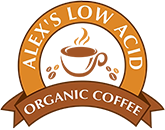Coffee lovers often worry about the acidity of their favorite brew and its potential impact on their digestive health. At Alex's, we understand these concerns and have developed a unique process to produce low-acid coffee without compromising its organic nature. In this article, we'll explain how we remove acid from Alex's Low-Acid Organic Coffee and address common questions about the process.
Understanding Coffee Acidity
Before diving into our acid removal process, let's take a moment to understand the acidity of coffee. Coffee contains various acids, with chlorogenic acids being the primary contributors to its acidity. Caffeine, although an acid itself, does not significantly affect the overall acidity of coffee. High-acid coffee can sometimes trigger symptoms such as acid reflux, making low-acid coffee a more desirable option for those seeking a smoother, less bitter flavor.
Conventional Drum Roasting: A Challenge for Acid Content
In the typical drum roasting process used by many coffee producers, green coffee beans are roasted in a metal drum through conduction and convection heating. However, this method preserves the acid content of the beans, making it difficult to achieve a low-acid final product.
Introducing Air Convection Roasting
To overcome the acid preservation challenge, we at Alex's have developed a proprietary air convection roasting method. This unique roasting technique reduces acidity without the need for toxic or synthetic chemicals. By heating the coffee beans from the inside out, we effectively minimize the acid content while preserving the organic integrity of our coffee. Additionally, our medium dark French Roast further enhances the rich, chocolatey flavor of the coffee.
The Benefits of Air Convection Roasting
Apart from lowering acidity, our air convection roasting method offers several additional advantages for coffee enthusiasts. Firstly, the reduced acidity contributes to a smoother and more balanced flavor profile. Unlike drum roasting, our roasting process significantly reduces the risk of an unpleasant burned taste. Furthermore, air convection roasting allows for shorter roasting times, ensuring a more authentic and consistent taste in every batch.
Decaffeination Process: Chemical-Free and Organic
For those concerned about caffeine and its potential impact on acid reflux, we offer a decaffeinated version of our low-acid coffee. Our decaffeination process adheres to the guidelines set by the National Organic Program and does not involve the use of chemicals. Instead, we utilize the Swiss water process, which gently removes caffeine while retaining the rich taste of our coffee. Rest assured, no methylene chloride, carbon dioxide, or ethyl acetate is ever used in our decaf process.
Brewing Tips for Low-Acid Coffee
Once you've chosen low-acid coffee like Alex's, there are a few brewing tips you can follow to further reduce the acidity and potential acid reflux:
Cold brew: Opt for cold brewing methods, as they tend to result in a less acidic coffee compared to traditional hot brewing.
Alkaline water: Consider using alkaline water instead of regular water to brew your coffee, as it helps reduce overall acidity.
Iced coffee: If hot beverages bother your stomach, iced coffee may be a gentler alternative.
Milk: Adding milk to your coffee can help reduce heartburn due to its calcium content.
Timing: Avoid consuming coffee right before bedtime to minimize the risk of acid reflux.
At Alex's, we take pride in offering a low-acid coffee that remains organic and chemical-free. Through our air convection roasting method and Swiss water decaffeination process, we have achieved a delicious, smooth, and balanced brew that caters to both taste and digestive health. Experience the difference in flavor and how you feel when you enjoy a cup of our low-acid, organic coffee.

